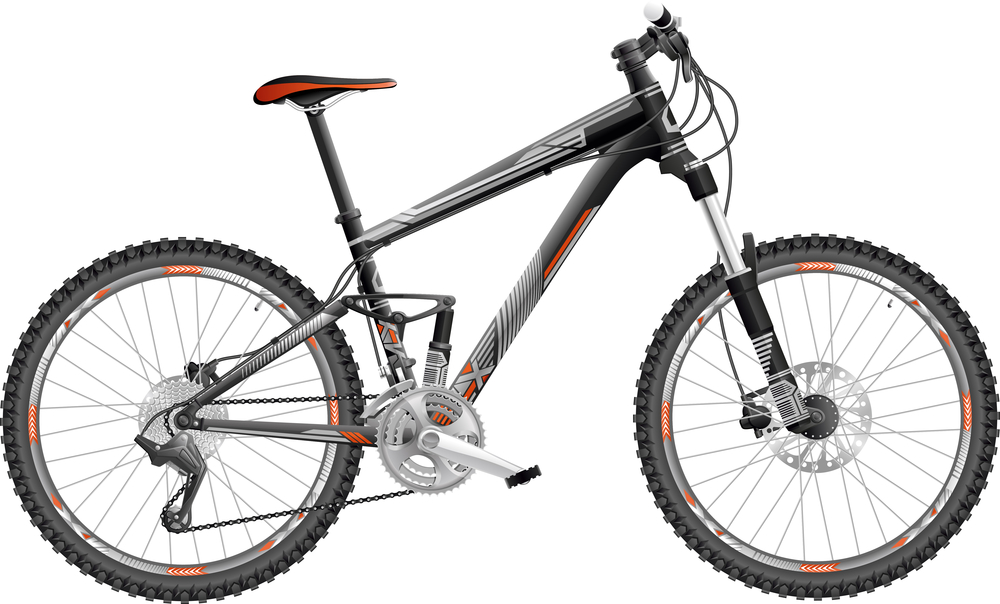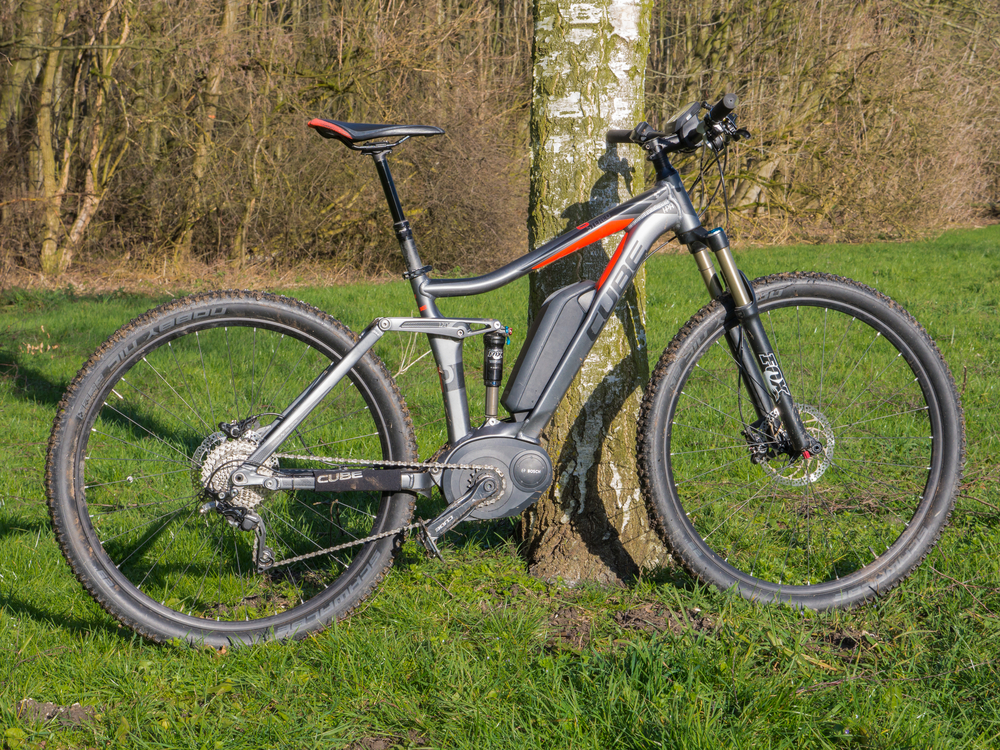Last Updated on November 2, 2023
When it comes to purchasing a mountain bike, one of the factors to consider is the bike’s weight. The weight of a mountain bike can affect your overall experience while mountain biking, such as how easy it is to maneuver and how much effort it takes to pedal. But how much does a mountain bike weigh on average?
According to our research, the average mountain bike weight is around 28 to 29 pounds (12.7 to 13.2 kg). This considers the different types of mountain bikes, such as cross country, all mountain, hardtail, full suspension, 29er, and downhill.
While the weight of a mountain bike may not be a significant factor for some riders, it can be important for others, especially those who are into cross-country racing or want to maximize their pedal performance.
In this article, we will dive deeper into how much do mountain bikes weigh, the factors that affect their weight, and whether weight truly matters when it comes to mountain biking.
Mountain Bike Types and Their Weights
When it comes to mountain bikes, there are several types available, each with its unique features and weight. In this section, we will discuss the different types of mountain bikes and their average weights.
Hardtail Mountain Bikes
Hardtail mountain bikes are the most common type of mountain bike. They come with a front suspension fork and a rigid rear end. Hardtail bikes are lightweight and efficient, making them popular among cross-country riders. On average, a hardtail mountain bike weighs around 26.95 lbs / 12.22 kg.
Full-Suspension Mountain Bikes

A full-suspension bike has both front and rear suspension, making it more comfortable and capable of handling rough terrain. It is heavier than hardtail bikes, with an average weight of around 30 pounds or 13.6078 kilograms.
Downhill Mountain Bikes
A downhill mountain bike is designed for steep descents and high speeds. They come with a full suspension, wide tires, and a slack geometry. Due to its heavy-duty construction and components, a downhill bike is the heaviest type of mountain bike, with an average weight of around 45 pounds or 20.4 kilograms.
Cross-Country Mountain Bikes
Cross-country mountain bikes are designed for speed and efficiency on smoother terrain. They come with a lightweight frame, narrow tires, and a rigid rear end. On average, a cross-country mountain bike weighs around 13.6kg or 30 pounds.
Trail Bikes

On average, a modern trail bike weighs between 27-32 pounds, though weights can vary depending on the frame material and components.
Bikes featuring aluminum frames with lower-end groupsets tend to be on the heavier side of that range, around 28 pounds or more. In contrast, high-end trail bikes made from lightweight carbon fiber and utilizing top-tier components like carbon wheelsets can drop below 30 pounds, even reaching as low as 24-26 pounds.
E-Mountain Bikes

The average weight of a modern e-mountain bike ranges from 40 to 60 pounds. Frame material, battery size, and motor wattage all influence the overall weight.
Aluminum e-bike frames typically start around 45 pounds, while high-end models utilizing carbon fiber can begin in the 38 to 42-pound range. Larger battery packs that provide longer range add 2-4 pounds compared to smaller batteries. More powerful motors weighing a few pounds more are used for climbing challenges.
Leading e-bike brands like Trek, Giant, and Specialized produce models suited for mountain biking that average between 40 to 60 pounds ready to ride, depending on specifications. While heavier than traditional mountain bikes, e-mountain bikes allow riders to pedal areas and trails, and that would not be possible without the electric assist. Their weight is considered very reasonable given their enhanced capabilities.
All-Mountain Bikes
All-mountain bikes are for riders who want to tackle various terrain, from smooth trails to technical descents. They come with full suspension, wider tires, and a more upright geometry than downhill bikes. On average, an all-mountain bike weighs around 30 pounds or 13.6078 kilograms.
Enduro Bikes

Frame material is a major determinant in a modern Enduro bike, with aluminum models typically weighing around 31 pounds. In comparison, high-quality carbon fiber can reduce the weight to between 27 and 30 pounds.
Heavier-duty components than trail bikes add some weight, such as larger volume tires, sturdier forks and shocks optimized for impacts, and brakes suited for high speeds. Pro-level enduro race bikes utilizing lightweight carbon wheels and the latest parts can dip below 30 pounds or even reach the high 20s.
Top brands like Santa Cruz, Yeti, and Ibis produce carbon and aluminum enduro models that normally fall between 29 to 32 pounds, ready to ride. While capable of rugged downhill performance, most quality production enduro bikes average 29 to 33 pounds overall.
The Impact of Frame Material on Weight
Different materials have different properties that affect the weight, durability, and stiffness of the bike. Let’s explore the impact of frame material on weight, focusing on four main types of materials:
Aluminum Frames
Aluminum frames are generally lighter than steel frames, but not as light as carbon fiber or titanium. The average weight of an aluminum frame is around 3-4 pounds.
Carbon Fiber Frames
Carbon fiber is a high-performance material known for its strength, stiffness, and lightness. Carbon fiber frames are the lightest of all frame materials, with an average weight of around 2-3 pounds. However, they are also the most expensive. Layering sheets make carbon fiber frames of carbon fiber over a mold and then bake them at high temperatures to create a solid, lightweight structure.
Steel Frames
Steel frames are known for their durability and strength, but they are also the heaviest of all frame materials. Steel frames can weigh anywhere from 4-6 pounds, depending on the thickness and quality of the steel used. However, steel frames are also very affordable and can provide a comfortable ride due to their ability to absorb vibrations.
Titanium Frames
Titanium is a high-end material known for its strength, durability, and lightness. Titanium frames are lighter than steel frames but heavier than carbon fiber and aluminum frames. The average weight of a titanium frame is around 2.5-3.5 pounds. Titanium frames are also costly due to the difficulty of working with the material.
Weight and Mountain Biking Performance
Weight is an important factor to consider when choosing a mountain bike. Its weight can have a significant impact on your performance, whether you’re climbing, descending, or racing. Here, we’ll explore how weight affects various aspects of mountain biking performance.
Climbing and Descending

A lighter bike will generally be easier to pedal uphill, as you’ll have less weight to move against gravity. On the other hand, a heavier bike will be more stable and easier to control on descents, as it will have more momentum and be less likely to bounce around.
Handling and Stability
A lighter bike will be more agile and responsive, making it easier to maneuver around tight corners and obstacles. However, a heavier bike will be more stable at high speeds and on rough terrain, as it will have more mass and be less likely to get knocked off course.
Comfort and Efficiency
A lighter bike will be easier to pedal for extended periods, reducing fatigue and allowing you to maintain a higher average speed. On the other hand, a heavier bike absorbs more of the bumps and vibrations from the trail, providing a smoother ride.
Racing and Competition
In most cases, a lighter bike will be faster and more efficient, allowing you to maintain a higher average speed and accelerate more quickly. However, some exceptions exist, such as in downhill racing, where a heavier bike may be more stable and easier to control at high speeds.
Choosing the Right Mountain Bike Weight
Here are a few things to consider when selecting the right weight for your mountain bike:
- Ability – Beginners may want a lighter bike to make it easier to maneuver and control. However, if you’re an experienced rider, you may prefer a heavier bike for better stability and control.
- Design – Full-suspension bikes are heavier than hardtail bikes, offering better shock absorption and comfort. On the other hand, hardtail bikes are lighter and more efficient but offer less comfort on rough terrain.
- Size – Larger bikes tend to be heavier than smaller bikes, so it’s essential to choose the right size for your body type to ensure maximum comfort and control.
- Budget – Generally, lighter bikes tend to be more expensive than heavier ones, so it’s essential to find a balance between weight and cost.
- Fitness – If you’re in good physical shape, you can handle a heavier bike without issues. However, if you’re not in the best shape, a lighter bike may be more suitable for you.
- Style – If you’re looking for a bike that looks sleek and modern, you may prefer a lighter bike with a more minimalist design. However, if you prefer a more classic look, you may opt for a heavier bike with a more traditional design.
- Upgrade – If you want to upgrade your bike in the future, opt for a slightly heavier bike with room for upgrades. However, if you don’t plan to upgrade, a lighter bike may be more suitable for you.
Frequently Asked Questions
What are some excellent mountain bike brands known for their lightweight designs?
There are several good mountain bike brands known for their lightweight designs. Some top brands include Santa Cruz, Giant, Cannondale, Trek, and Specialized. These brands offer a variety of lightweight mountain bikes that are perfect for riders who want to go fast and tackle challenging terrain.
Can you provide a price range for purchasing a lightweight mountain bike?
The price range for purchasing a lightweight mountain bike can vary greatly depending on the brand, model, and features. Generally, you can expect to pay anywhere from $1,000 to $10,000 for a high-quality lightweight mountain bike. However, there are also some budget-friendly options available for those who don’t want to spend a lot of money.
What is considered the lightest weight for a mountain bike?
The lightest weight for a mountain bike can vary depending on the brand and model. Some of the lightest mountain bikes on the market weigh as little as 20 pounds. However, these bikes are typically designed for racing and may not be suitable for all types of riding.
At what weight does a mountain bike become heavy?
A mountain bike is generally considered heavy when it weighs more than 30 pounds. However, this can vary depending on the rider’s preferences and the type of riding they plan. For example, a heavier bike may be more stable and better suited for downhill riding.
What is the average weight of a Giant mountain bike?
The average weight of a Giant mountain bike can vary depending on the model and features. However, most Giant mountain bikes weigh between 25 and 35 pounds. The bike’s weight will also depend on the size of the frame and the type of components used.
How does the weight of a Cannondale mountain bike compare to other brands?
Cannondale mountain bikes are generally known for their lightweight designs. Many of their bikes are among the lightest on the market. However, the weight of a Cannondale mountain bike will depend on the model and features. Generally, you can expect a Cannondale mountain bike to weigh between 20 and 35 pounds.
What’s the Best Mountain Bike Weight for You?
There is no single best mountain bike weight, as the ideal depends on several personal factors. A rider’s riding style, the types of terrain they typically encounter, their fitness level, and individual preferences all contribute to determining the appropriate weight.
Cross-country racers focused on climbing performance will favor lighter bikes, while downhill riders prioritize stability over weight. Heavier, slack-angled bikes provide better control on rugged trails, whereas more lightweight bikes can suffice on smoother XC trails.
In general, recreational trail riders often find bikes in the 25-30 pound range offer a suitable balance of pedaling efficiency and handling capabilities for various terrains. Dropper post-equipped trail and all-mountain bikes at these weights provide capable climbing and descending performance for most riding needs.
As a baseline, many consider anything under 30 pounds for an all-rounder respectable without compromising capabilities like maneuverability and durability.
However, the best weight can only truly be determined through hands-on testing and understanding an individual’s unique riding style and conditions.
Related:

